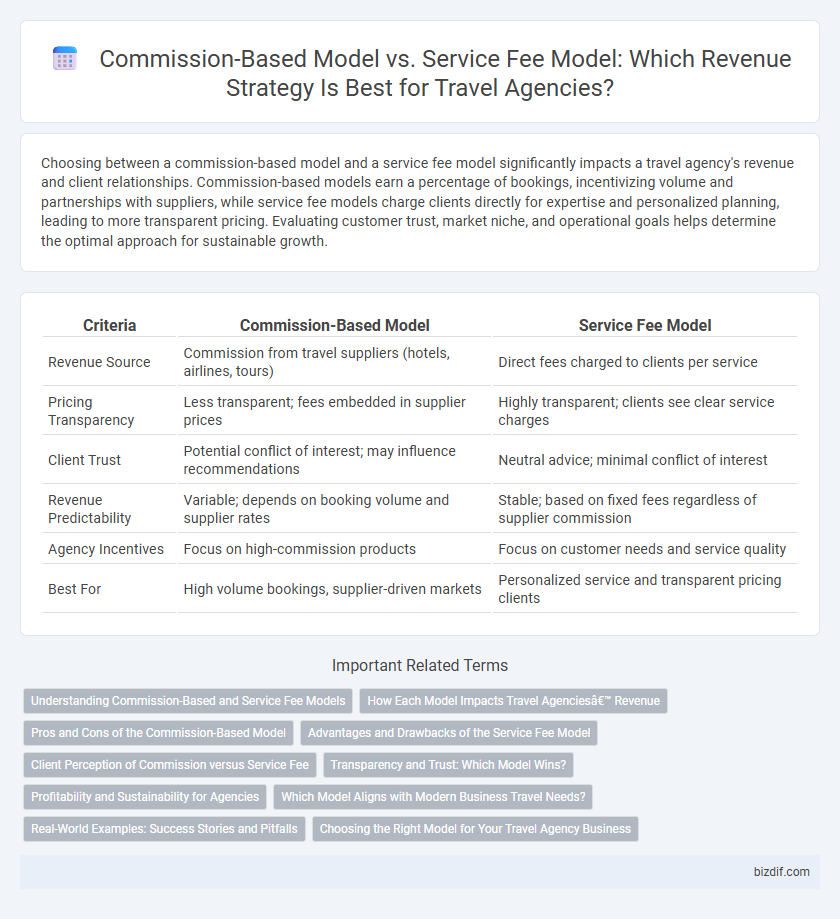Choosing between a commission-based model and a service fee model significantly impacts a travel agency's revenue and client relationships. Commission-based models earn a percentage of bookings, incentivizing volume and partnerships with suppliers, while service fee models charge clients directly for expertise and personalized planning, leading to more transparent pricing. Evaluating customer trust, market niche, and operational goals helps determine the optimal approach for sustainable growth.
Table of Comparison
| Criteria | Commission-Based Model | Service Fee Model |
|---|---|---|
| Revenue Source | Commission from travel suppliers (hotels, airlines, tours) | Direct fees charged to clients per service |
| Pricing Transparency | Less transparent; fees embedded in supplier prices | Highly transparent; clients see clear service charges |
| Client Trust | Potential conflict of interest; may influence recommendations | Neutral advice; minimal conflict of interest |
| Revenue Predictability | Variable; depends on booking volume and supplier rates | Stable; based on fixed fees regardless of supplier commission |
| Agency Incentives | Focus on high-commission products | Focus on customer needs and service quality |
| Best For | High volume bookings, supplier-driven markets | Personalized service and transparent pricing clients |
Understanding Commission-Based and Service Fee Models
Travel agencies often rely on two primary revenue structures: the commission-based model, where agencies earn a percentage from suppliers like hotels and airlines, and the service fee model, where clients pay a direct fee for booking assistance and personalized services. Commission-based earnings depend on negotiated rates with travel partners, incentivizing agencies to promote specific products, while service fees provide transparent costs for expert guidance regardless of supplier incentives. Understanding these models helps clients evaluate total expenses and agencies balance profitability with client satisfaction.
How Each Model Impacts Travel Agencies’ Revenue
The commission-based model allows travel agencies to earn a percentage of the total booking value, creating a revenue stream directly tied to sales volume and supplier partnerships. In contrast, the service fee model generates consistent income by charging clients upfront fees regardless of the booking cost, enhancing revenue predictability and minimizing dependence on third-party commissions. Both models influence cash flow dynamics and profitability, with commission-based earnings fluctuating based on market trends and service fees offering more stable financial outcomes.
Pros and Cons of the Commission-Based Model
The commission-based model in travel agencies offers agents financial incentives directly tied to sales, driving motivation to close deals and potentially boosting overall revenue. However, reliance on commissions can lead to conflicts of interest where agents prioritize higher-commission products over customer preferences, possibly impacting client satisfaction. This model may also create income instability for agents during low sales periods, affecting service consistency and long-term agency loyalty.
Advantages and Drawbacks of the Service Fee Model
The Service Fee Model allows travel agencies to charge clients transparent, fixed fees for their expertise, fostering trust and clarifying pricing structures. This model reduces dependency on third-party commissions, enabling agencies to offer unbiased recommendations tailored to customer needs. However, some clients may perceive service fees as an extra cost, potentially limiting sales if the value proposition is not clearly communicated.
Client Perception of Commission versus Service Fee
Clients often perceive the commission-based model as less transparent since the travel agency's payment is tied to supplier commissions, potentially leading to concerns about biased recommendations. In contrast, the service fee model is viewed as more straightforward and trustworthy because fees are explicitly stated, enhancing clarity on costs. Transparency in pricing directly influences client trust and satisfaction, thereby impacting the agency's reputation and client retention.
Transparency and Trust: Which Model Wins?
Commission-based models often lack transparency as clients may be unaware of hidden markups embedded in travel package prices, potentially undermining trust. Service fee models provide clear pricing by charging upfront, allowing clients to understand exactly what they pay for, thereby enhancing transparency and fostering stronger client relationships. Travel agencies adopting service fee structures tend to build higher trust levels, as customers appreciate the straightforward approach without surprise costs.
Profitability and Sustainability for Agencies
Commission-based models generate revenue through partnerships with suppliers, allowing agencies to earn a percentage of bookings, which can lead to variable income but strong profit potential when sales volume is high. Service fee models provide consistent, transparent income by charging clients directly for expertise and planning, enhancing cash flow predictability and long-term financial sustainability. Agencies often balance both models to optimize profitability while maintaining customer trust and adapting to fluctuating market demands.
Which Model Aligns with Modern Business Travel Needs?
The service fee model offers transparency and predictability, meeting the demand for clear budgeting in modern business travel. Commission-based models may incentivize agents to prioritize higher-cost bookings, potentially misaligning with corporate cost-control objectives. Service fees align better with businesses seeking customized travel solutions and accountability for travel expenses.
Real-World Examples: Success Stories and Pitfalls
Many travel agencies thrive using the commission-based model, earning revenue through partnerships with airlines, hotels, and tour operators, exemplified by Expedia's growth driven by strong vendor commissions. Conversely, agencies like Virtuoso emphasize a service fee model, charging clients directly for personalized travel planning, which improves transparency but may limit customer base size. Pitfalls include potential conflicts of interest in commission-based arrangements and client resistance to upfront fees in service fee models, impacting agency trust and long-term loyalty.
Choosing the Right Model for Your Travel Agency Business
Choosing the right revenue model for your travel agency--whether commission-based or service fee--is crucial for sustained profitability and client satisfaction. Commission-based models generate income through partnerships with hotels, airlines, and tour operators, ensuring a steady flow of passive revenue, while service fee models provide transparent pricing that builds trust and allows customization of travel planning services. Analyze your target market preferences and operational costs carefully to align your business strategy with the model that maximizes growth and client loyalty.
Commission-Based Model vs Service Fee Model Infographic

 bizdif.com
bizdif.com